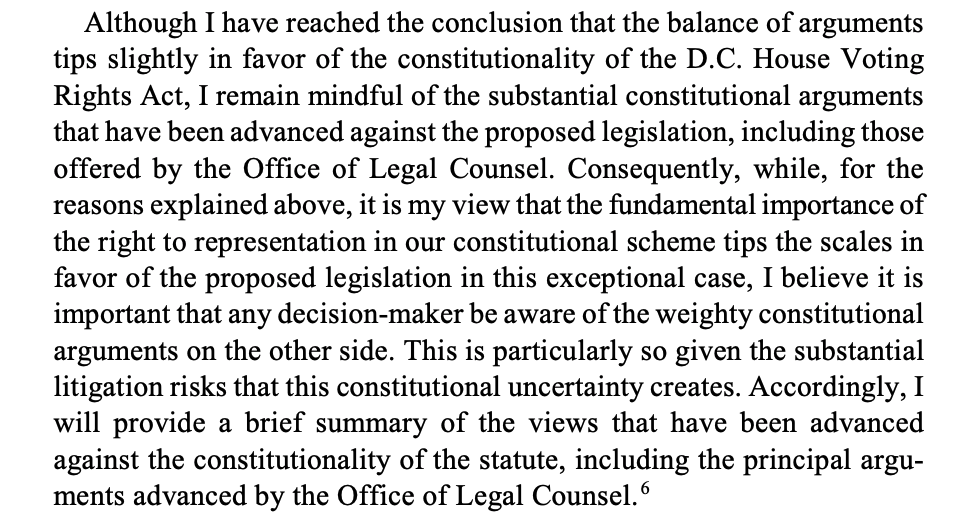1/ Remember the dispute at the dawn of the Obama administration about the constitutionality of the District of Columbia Voting Rights Act of 2009, which would have given the District one vote in the House?
2/ . @johnson_carrie reported that OLC concluded that the bill was unconstitutional, but was overruled by Attorney General Holder, who “ordered up a second opinion from other lawyers in his department and determined that the legislation would pass muster.” https://www.washingtonpost.com/wp-dyn/content/article/2009/03/31/AR2009033104426_pf.html
3/ As . @johnson_carrie explained: “Holder rejected [OLC’s] advice and sought the opinion of the solicitor general's office, where lawyers told him that they could defend the legislation if it were challenged after its enactment.”
4/ This sparked controversy. E.g., @joldmcginn claimed that Holder—a D.C. voting rights proponent—politicized legal interpretation and applied the wrong standard for purposes of presidential signing (namely, that the law was “defensible” in court). https://lawliberty.org/eric-holder-and-the-rule-of-law/.
5/ We can now get a fuller picture of what happened, since OLC has published the relevant opinions.
6/ Acting OLC Chief David Barron wrote Holder on 2-25-09 with an attached letter for the WH Counsel reflecting OLC’s view. The document is here. https://assets.documentcloud.org/documents/20432657/barron-olc-opinion-dc.pdf. The relevant conclusion:
7/ The next day, 2-26-09, Holder wrote his own Memorandum to the WH Counsel. (I do not believe that the fact of this opinion’s existence has previously been reported, but I might be wrong about that.) There is no indication who drafted the opinion, but Holder signed it.
8/ The Holder opinion concluded that the question was “close” but that the balance of considerations—including the fact that “the most basic rights in a democracy” were at stake—"tips in favor of finding this proposed legislation constitutional.”
9/ In my view Barron easily has the better of the legal arguments. Yet it must have been a hard opinion to write, since he was reaffirming a Bush administration legal opinion, and he must have known that Holder had strong views on the matter.
10/ OLC did its job, which in the context of pending bills is to give a straight-up legal analysis so that POTUS can exercise his constitutional responsibilities in deciding whether to sign or veto the bill.
11/ Holder “in this exceptional case” didn’t apply usual DOJ test for assessing a bill’s constitutionality. He argued that since “no clearly controlling constitutional text or squarely on-point precedent” required otherwise, importance of expanding franchise tipped the scales.
12/ Did Holder act inappropriately? Some of the original criticisms were misplaced. Whatever may have actually happened at DOJ back in the day, Holder signed an opinion with significant legal analysis on the matter, and did not really rely on a “defensible in court” standard.
14/ Ultimately, the legal question is one for the president to decide. And on this one we have reason to think Obama, a lawyer, thought the bill was constitutional, since he favored DC voting rights in Congress and had co-sponsored similar bills as a U.S. senator.
15/ There’s much more to say, including about why OLC decided to publish these opinions, but no time. This is a great case study about the relevant roles of OLC, the AG, and POTUS in determining the constitutionality of bills for purposes of presidential signature.
16/ The opinions linked above were drawn from the larger recently published collection here, https://www.justice.gov/op-olc-v033/download, and here, https://www.justice.gov/op-olc-v034/download. Lots of other interesting things in here from early Obama OLC

 Read on Twitter
Read on Twitter



